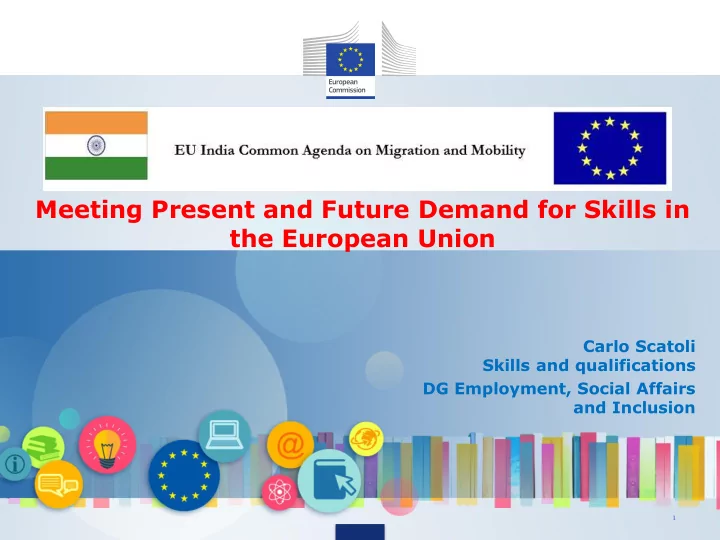

Meeting Present and Future Demand for Skills in the European Union Carlo Scatoli Skills and qualifications DG Employment, Social Affairs and Inclusion 1
Three main challenges we face 1. Persistent levels of low skilled workers 2. Digital transformation, globalisation, robotisation, automation 3. Ageing and shrinking workforce 4. Economy of transitions/Life Long Learning imperative 2
3
4
Skills mismatch Dark blue: correctly matched tertiary qualification holders 5
A new model for skills development 6
7
Low achieving students (science, reading and maths) 8
• 60 to 65 million adult workers with low qualification (less than upper secondary edication) Participation of low-qualified adults in learning opportunites: • from 3.9% in 2010 to 4.3% in 2017 Source: EU Labour Force Survey, Eurostat
Tertiary attainment (30 – 34 years) 10
NEW SKILLS AGENDA FOR EUROPE Quality & Visibility and Skills relevance of comparability intelligence skills 1. Upskilling 7. Revision of Pathways EUROPASS 5. Revision of EQF 2. Key Competences 8. Analysis of brain Framework drain 9. Blueprint for 3. VET as a first Sectoral Cooperation choice on Skills 6. Skills profile tool for 3 rd country nationals 4. Digital Skills and 10. Initiative on Jobs coalition graduate tracking
Blueprint for sectoral cooperation on skills – 3 rd wave sectors Call for proposals Oct 2018Call for proposals: Oct 2018 Timeline • Bio-economy, new technologies and innovation Timeline in agriculture Call for proposals: Call for proposals: Oct 2018 • Batteries for electro-mobility Oct 2018 Application deadline: Application deadline: end-Feb 2018 • Defence technologies end-Feb 2018 Start dates: • Digitalisation of the energy value chain Start dates: Nov 2019, Dec 2019, Jan 2020 Nov 2019, Dec 2019, Jan 2020 • Energy-intensive industries/industrial symbiosis • Microelectronic manufacturing & design National/ regional EU partnerships partnerships 12
January 2018 update of the 2006 Key Competence Framework Literacy Digital Entrepreneurship competence competence competence Multi-lingual Personal, competence Cultural social & awareness & Learning to expression learn competence competence Mathematical competence & competence in science, Citizenship technology, competence engineering
European Qualifications Framework translation grid for qualifications across the EU and beyond 8-level meta framework covering all types and levels of qualifications defined in terms of learning outcomes 27 MS have already referenced their national frameworks to the EQF 19 MS are putting the EQF levels on certificates and diplomas A total of 39 countries currently participate and have committed to the EQF 14
Competence Frameworks • What? • A reference framework providing an comprehensive and shared understanding • Method: • Strong scientific basis (Identifying – Analysing – Mapping – Piloting/Testing) • Consensus building with multiple stakeholders • Updating and revising • Policy: • 2006 Recommendation on Key Competences for Lifelong Learning • 2016 New Skills Agenda for Europe
The Digital Competence Framework
VALIDATION Validation means a process of confirmation by an authorised body that an individual has acquired learning outcomes measured against a relevant standard Documentation Certification Identification Assessment Skills are not available…. …or just not visible? 1 17 17 7
Labour market & Skills intelligence activities in the EU – why? • - What are skills needs and gaps by country, sector, occupation? • - Pan-European skills forecasts carried out by CEDEFOP based on Eurostat LFS data (on EU Skills Panorama) • • - What is the level of skills mismatches in the EU? • - European Skills and Jobs Survey (CEDEFOP)
Labour market Skills intelligence activities in the EU – why? • - What will be the skills of the future (21 st century skills)? • - Cedefop skills forecast, Big Data Analysis such as Cedefop's Real Time Labour Market project • -What is the level of digital skills in the EU and MS? • - Digital Economy and Society Index (DESI) – Human Capital Dimension – basic usage and advanced usage sub-dimensions
National Skills Strategies to diagnose and address skills challenges in Member States Joint work by the OECD, the EC and the MS (E+ budget) Based on the OECD Skills Strategy methodology 2 phases: diagnostic and action plan Action plan Diagnostic Starting later phase phase in2018 • SI • IT (completed) • PL • PT (completed) • ES (completed) • LV • AT (completed) • NL (completed) • BE/VL 20
European Skills Index compares performance of country's skills system in term of 3 pillars: development, activation and matching Developed by CEDEFOP 15 indicators grouped in 3 pillars There will be a launch on 27 September to present country ranking & discuss policy implications Development • Training and education activities Activation • Transition into work and LM participation Matching • Extent of effective skills matching on LM !!! Expert interpretation important !!! 21
Information sources and further reading • EU Skills Panorama ( !!! Analytical Highlights by Country & Making Skills Work Index): http://skillspanorama.cedefop.europa.eu/en • European Qualifications Framework : https://ec.europa.eu/ploteus/en • European Inventory on Validation ( !!! Country Reports): http://www.cedefop.europa.eu/en/events-and-projects/projects/validation-non- formal-and-informal-learning/european-inventory • OECD Adult Skills Survey, PIAAC: http://www.oecd.org/skills/piaac/ • DigComp: https://ec.europa.eu/jrc/en/digcomp/digital-competence-framework • EntreComp: https://ec.europa.eu/jrc/en/publication/eur-scientific-and- technical-research-reports/entrecomp-entrepreneurship-competence- framework • Digital Scoreboard : http://ec.europa.eu/digital-agenda/en/digital-agenda- scoreboard • Europe's Digital Progress Report 2018 ( !!! Country Reports): https://ec.europa.eu/digital-single-market/en/news/europes-digital-progress- report-2017 22
Recommend
More recommend